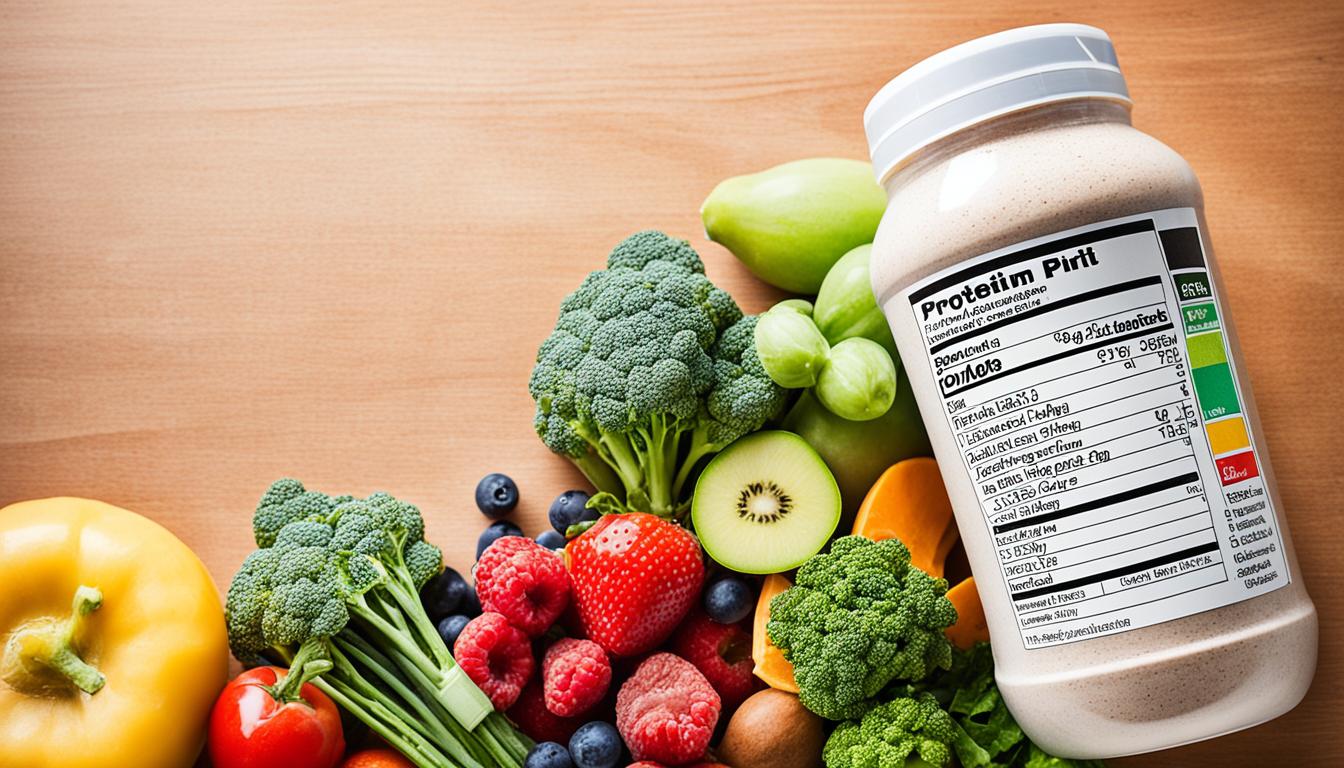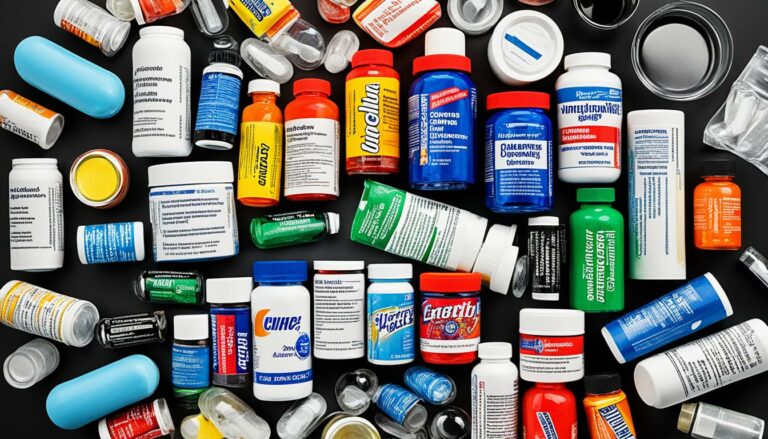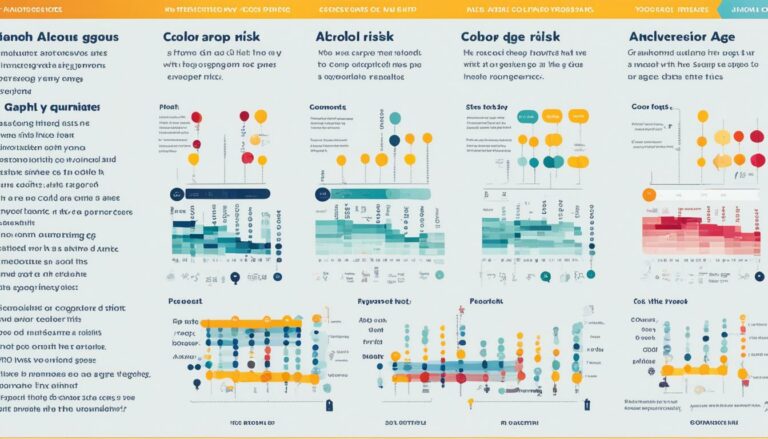Teens & Protein Powder: Safety and Guidance
Protein powder has become a popular supplement among athletes and fitness enthusiasts. But what about teenagers? Can teens take protein powder? It’s essential to understand the safety and guidance surrounding protein powder consumption for adolescents.
Dr. Jacqueline Winkelmann, a pediatrician and sports nutrition expert, advises that protein supplements are generally unnecessary for young athletes. The current recommendation for protein intake for young athletes is 1.0-1.4 grams per kilogram per day. These protein needs can be easily met through a balanced diet that includes lean meats, dairy products, tofu, beans, lentils, and nuts.
It’s crucial to note that consuming extra protein will not lead to further strength or muscle gain for teens. In fact, excessive protein intake can have adverse effects, including nausea, loss of appetite, diarrhea, and stress on the liver and kidneys.
The timing of protein intake is also important for optimal muscle growth and recovery. Consuming small amounts of protein throughout the day, especially before and after exercise, is the most efficient approach. However, protein supplements may be beneficial for specific populations, such as vegetarian or vegan athletes, those with medical conditions, or those who are underweight. In such cases, it’s important to consult with a healthcare professional to ensure safe and appropriate protein supplement use.
Key Takeaways:
- Protein supplements are generally unnecessary for young athletes.
- Adolescents can meet their protein needs through a balanced diet.
- Consuming excessive protein can have adverse effects on health.
- The timing of protein intake is crucial, especially before and after exercise.
- Protein supplements may be beneficial for certain populations under the supervision of a healthcare professional.
How Much Protein Do Young Athletes Need?
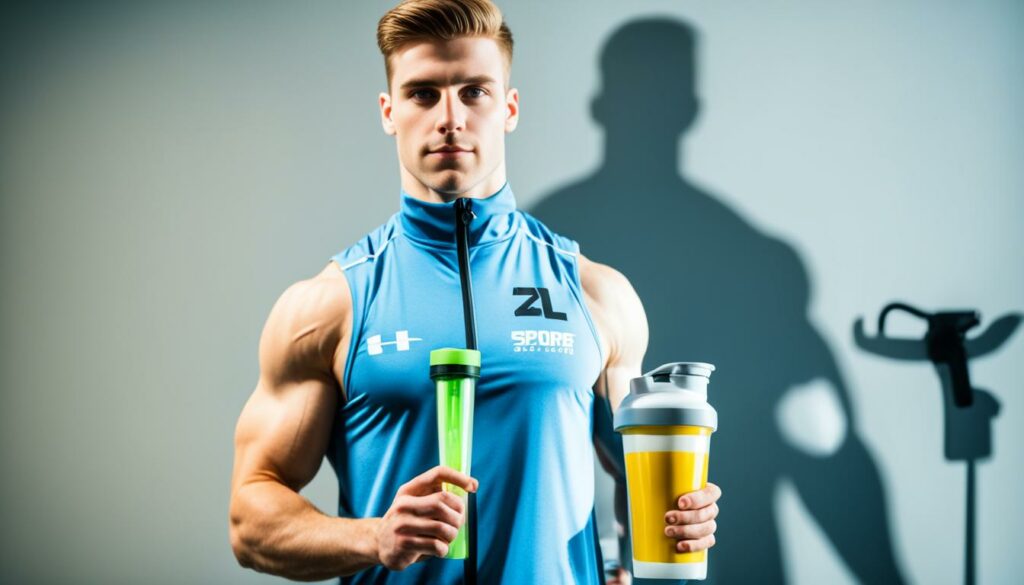
The protein needs of young athletes are slightly higher than those of their non-athlete peers. The current recommendation for protein intake for young athletes is approximately 1.0-1.4 grams per kilogram per day. This higher protein intake is necessary to support growth, muscle building, repair, and fueling intense exercise.
Studies have shown that many young athletes consume two to three times the recommended amount of protein through their regular diet alone. While some additional protein is beneficial, consuming excessive amounts may not provide any additional benefits and can even have negative consequences.
A balanced approach to protein intake is key for young athletes. Consuming the recommended amount of protein, along with a variety of other nutrients, can help support their overall health and performance.
It’s important to note that protein requirements may vary depending on factors such as age, gender, weight, and activity level. Athletes who engage in more intense and frequent training may require higher amounts of protein to meet their increased energy needs.
The Role of Protein in Young Athletes
Protein plays a crucial role in the development and maintenance of muscle mass and strength. It provides the essential amino acids needed for muscle repair and recovery after exercise.
In addition to muscle growth, protein also supports other important physiological functions in young athletes, including:
- Building enzymes, hormones, and antibodies
- Aiding in the transportation and storage of nutrients
- Supporting a healthy immune system
By meeting their protein needs, young athletes can enhance their athletic performance and protect their overall health.
| Recommended Protein Intake for Young Athletes | Protein Range (grams per kilogram per day) |
|---|---|
| Minimum Recommended Intake for Young Athletes | 1.0 grams per kilogram per day |
| Athletes Engaging in Intense Training | 1.2-1.4 grams per kilogram per day |
It’s important for young athletes and their parents to be aware of their protein needs and make appropriate dietary choices to ensure optimal performance and recovery.
Best Sources of Dietary Protein for Young Athletes

Young athletes require adequate protein in their diet to support growth, muscle development, and overall performance. Including a variety of protein-rich foods in their meals and snacks is essential. The following are some of the best sources of dietary protein for young athletes:
Lean Meats
Lean meats such as chicken, turkey, lean beef, and fish are excellent sources of high-quality protein. Eating these meats helps provide essential amino acids that support muscle growth and repair.
Dairy Products
Dairy products like milk, cheese, and yogurt are not only rich in protein but also provide calcium, which is important for strong bones and overall bone health. Including dairy in the diet of young athletes can help meet their protein needs and support their physical development.
Plant-Based Protein
Plant-based protein sources are ideal for young athletes who follow vegetarian or vegan diets or prefer plant-based options. Beans, lentils, tofu, and nuts are excellent sources of plant-based protein that can provide the necessary amino acids and support muscle growth.
By incorporating these protein-rich foods into their diet, young athletes can ensure they are meeting their protein requirements for optimal performance and growth. The table below provides a comparison of the protein content in different food sources:
| Food Source | Protein Content per 100g |
|---|---|
| Chicken Breast | 31g |
| Tofu | 8g |
| Salmon | 22g |
| Yogurt (Plain, Low-fat) | 5g |
| Black Beans | 21g |
| Almonds | 21g |
Note: Protein content may vary depending on the brand and preparation method.
Including a combination of lean meats, dairy products, and plant-based protein sources in their diet ensures that young athletes receive a well-rounded and balanced protein intake. This provides the necessary nutrients for their physical growth, muscle development, and overall athletic performance.
The Importance of Anabolic Hormones and Physical Training
When it comes to building muscle mass, consuming extra protein alone is not enough. The stimulation of anabolic hormones, such as testosterone, and physical training play vital roles in the process. Anabolic hormones are responsible for promoting muscle growth and repair, while physical training provides the necessary stimulus for muscle adaptation and development.
While protein is essential for muscle repair and growth, it is the combination of anabolic hormones and physical training that leads to significant muscle gain. Anabolic hormones help regulate protein synthesis and support the growth of muscle fibers. Without their presence, consuming excessive protein will not lead to further muscle development.
Physical training, on the other hand, provides the necessary stimulus to activate anabolic hormones and promote muscle growth. Exercise, especially resistance training, creates small micro-tears in muscle fibers. In response, the body initiates the release of anabolic hormones, which triggers the repair and growth of these muscle fibers, resulting in increased muscle mass.
“The integration of anabolic hormones and physical training is crucial for muscle growth and development.”
To maximize muscle growth, individuals should engage in a well-rounded training regimen that incorporates both resistance training and other forms of physical activity. A combination of strength training exercises, cardiovascular workouts, and flexibility exercises can help optimize muscle growth while enhancing overall physical fitness.
It is essential to note that anabolic hormones are naturally produced by the body, and their levels can be influenced by factors such as age, genetics, and overall health. However, the body’s natural production of anabolic hormones may not always be sufficient for significant muscle gains. This is particularly true for individuals seeking to enhance their athletic performance or those with specific muscle-building goals.
In such cases, some individuals may resort to anabolic hormone supplements. However, it is essential to approach this avenue with caution and consult with a healthcare professional. Improper use of anabolic hormone supplements can have adverse effects on health and may lead to serious complications.
By understanding the importance of anabolic hormones and the role of physical training, individuals can optimize their muscle growth potential and achieve their fitness goals effectively.
Side Effects of Consuming Too Much Protein

Consuming excessive amounts of protein can have negative effects on the body, including various side effects and potential stress on the liver and kidneys. While protein is an essential nutrient for muscle building and overall health, it’s important to consume it in moderation and within recommended limits.
Side Effects of Excess Protein
When individuals consume more protein than their body needs, it can lead to a range of side effects. Some common side effects of excess protein intake include:
- Nausea: Excessive protein consumption can cause feelings of nausea and stomach discomfort.
- Loss of Appetite: Consuming too much protein can also lead to a loss of appetite, making it difficult to consume a well-balanced diet.
- Diarrhea: Excess protein intake can disrupt the digestive system and result in diarrhea.
Additionally, consuming high amounts of protein can put stress on the liver and kidneys. These organs are responsible for metabolizing and filtering waste products from the body. When protein intake exceeds the body’s requirements, the liver and kidneys need to work harder to process and eliminate the excess protein.
Impact on the Liver and Kidneys
The liver and kidneys play crucial roles in maintaining overall health. Excess protein consumption can potentially put stress on these organs, leading to liver and kidney dysfunction. The liver is responsible for breaking down and metabolizing protein, while the kidneys filter waste products from the blood, including the byproducts of protein metabolism.
While the liver and kidneys can handle moderate amounts of protein, consistently consuming excessive protein can overload these organs and potentially lead to long-term health issues. It’s important to maintain a balanced diet and avoid excessive protein intake to support the optimal functioning of the liver and kidneys.
Note: Insert the provided image here:
| Side Effects of Excess Protein | Impact on the Liver and Kidneys |
|---|---|
|
|
It is essential to consume protein in moderation and within recommended levels to avoid these side effects and potential harm to the liver and kidneys. Individuals should consult a healthcare professional or registered dietitian to determine their specific protein requirements and ensure a well-balanced diet.
The Importance of Timing Protein Intake
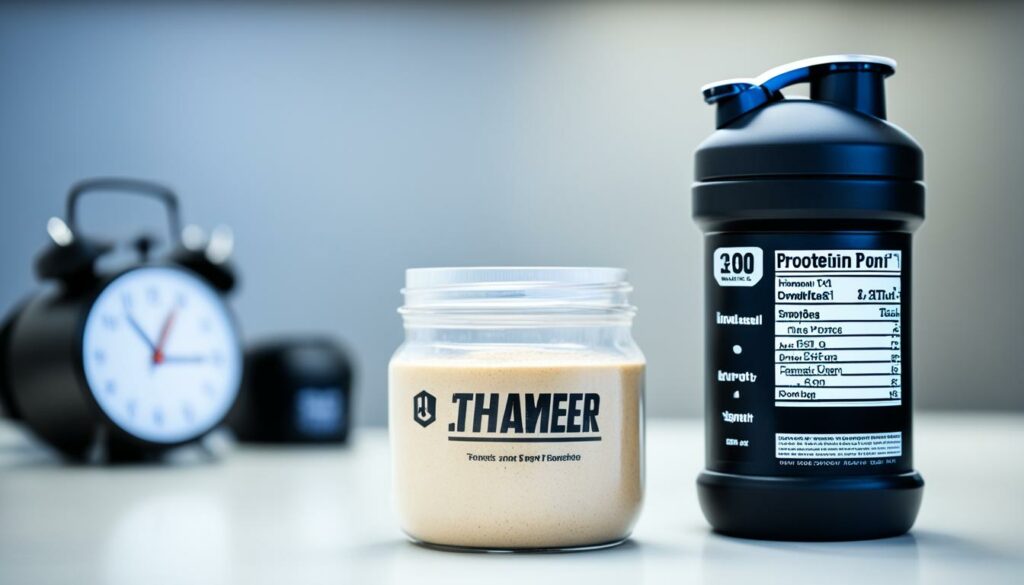
Consuming protein at the right times can significantly benefit athletic performance and recovery. It is important for athletes to understand the significance of protein timing in optimizing their training results.
When it comes to protein intake, it is recommended to consume small amounts of protein throughout the day, especially before and after exercise. This approach ensures a steady supply of amino acids, the building blocks of protein, to support muscle repair and growth.
Protein intake before exercise prepares the body for the upcoming physical activity. Consuming protein-rich foods or drinks about 30-60 minutes before a workout provides the necessary amino acids to enhance muscle protein synthesis during exercise. This helps to minimize muscle breakdown and improve recovery.
After exercise, the body is in a prime state for muscle repair and replenishment. Consuming protein within 30 minutes of completing a workout can support muscle protein synthesis and replenish glycogen stores. This aids in muscle recovery, reduces muscle damage, and promotes adaptation to exercise.
“Timing protein intake before and after exercise can optimize muscle repair, recovery, and adaptation to training.”
Examples of protein-rich snacks that can be consumed before and after exercise include:
- Chicken
- Fish
- Beef
- Eggs
- Milk
A balanced meal containing protein, carbohydrates, and fats can also be consumed within a few hours post-workout to support optimal recovery and muscle growth.
By timing protein intake strategically, athletes can maximize the benefits of their training and achieve their performance goals.
| Benefits of Timing Protein Intake | Optimal Protein Sources |
|---|---|
|
|
Protein Supplements for Young Athletes
When it comes to protein supplements for young athletes, it’s important to weigh the pros and cons. While protein powders are popular among athletes, they are generally unnecessary for young athletes who can obtain sufficient protein from whole food sources. It’s crucial to consider the potential risks and benefits before incorporating protein supplements into a young athlete’s diet.
One of the main concerns with protein supplements is that they are not regulated by the FDA. This means that the quality and safety of these products may vary. Some protein powders may contain artificial sweeteners and chemicals, which may not be ideal for young athletes. It’s essential for parents to consider the reputation and safety ratings of protein supplements before purchasing them.
However, there are instances where protein supplements can be beneficial for young athletes. Athletes who follow vegetarian or vegan diets may struggle to meet their protein needs solely through food sources. In such cases, protein supplements can provide a convenient and easily digestible source of protein.
Additionally, young athletes with specific medical conditions or who are underweight may benefit from protein supplements. In these cases, it’s important for protein intake to be supervised by a healthcare professional to ensure it aligns with the individual’s needs and goals.
To help you make a well-informed decision, it’s recommended to consult with a healthcare professional or registered dietitian before incorporating protein supplements into a young athlete’s routine. They can provide guidance based on the individual’s specific nutritional requirements and goals.
Below is a table summarizing the pros and cons of protein supplements for young athletes:
| Pros | Cons |
|---|---|
| – Convenient source of protein | – Not regulated by the FDA |
| – Beneficial for vegetarian/vegan athletes | – May contain artificial sweeteners and chemicals |
| – Useful for athletes with specific medical conditions or who are underweight | – Requires supervision by a healthcare professional |
Overall, while protein supplements can have their advantages, they are not necessary for young athletes who can meet their protein needs through a well-rounded diet. The use of protein supplements should be carefully considered and monitored to ensure they align with the individual’s unique circumstances and goals.
Safe Weight Gain and Muscle Mass Increase for Adolescent Athletes

Ensuring safe weight gain and increasing muscle mass in adolescent athletes is crucial for their athletic performance and overall health. By implementing strategic dietary and training approaches, young athletes can achieve their goals.
Focusing on Nutrition
An essential component of safe weight gain and muscle mass increase is consuming additional calories, primarily from protein-rich sources. Aim for an extra 300-500 calories per day to support growth and development.
Here are some effective strategies to optimize nutrition:
- Do not skip breakfast. Start the day with a nutritious meal that includes protein, carbohydrates, and healthy fats.
- Eat 5-9 times per day, including balanced meals and snacks. Regular fueling helps provide a constant supply of nutrients for muscle growth.
- Increase portion sizes to meet calorie needs. Properly measuring portion sizes or consulting a registered dietitian can ensure accurate calorie intake.
- Add protein-rich foods to your diet, such as lean meats, eggs, dairy products, beans, and nuts. They provide essential amino acids for muscle growth and repair.
The Importance of Resistance Training
Resistance training is the cornerstone of muscle mass increase in adolescent athletes. By incorporating strength training exercises into their routine, athletes can stimulate muscle growth and enhance performance.
Here are a few key points to consider:
- Train under adult supervision to ensure proper form and technique, minimizing the risk of injury.
- Adopt different training approaches to target muscle size and power/strength. This may include high volume and moderate intensity for muscle size or low volume and high intensity for power and strength gains.
- Gradually progress the intensity and resistance of training over time to continue challenging the muscles and promoting growth.
The Role of Rest Days
Rest days are just as important as training days when it comes to safe weight gain and muscle mass increase. Adequate rest allows the body to recover, repair muscle tissue, and grow stronger.
Make sure to:
- Include rest days in your training schedule to give your body the time it needs to rebuild and recuperate.
- Aim for 8-9 hours of sleep per night to support optimal recovery and overall health.
By following these guidelines and making appropriate adjustments based on individual needs, adolescent athletes can achieve safe weight gain and increase muscle mass effectively. Always consult with a healthcare professional or certified strength and conditioning specialist for personalized advice and guidance.
The Importance of Rest Days

Athletes often focus on intense training sessions to improve their performance. However, rest days play a crucial role in maintaining a healthy lifestyle and optimizing athletic performance. During rest days, the body has the opportunity to recover and rebuild, leading to increased muscle mass and overall well-being.
Strength training is an essential part of an athlete’s routine. To maximize the benefits of strength training, it is important to alternate between training days and rest days. This allows the body to repair and strengthen the muscle fibers that were broken down during exercise. By incorporating rest days into the training schedule, athletes can avoid overexertion and reduce the risk of injury.
Aside from physical recovery, sleep also plays a vital role in an athlete’s overall health and performance. Adequate sleep is especially important for adolescent athletes, as it supports their growth and development. Research has shown that sleep deprivation can negatively impact athletic performance, leading to decreased reaction time, impaired decision-making, and reduced endurance.
Athletes, especially adolescent athletes, should aim for 8-9 hours of sleep per night to support their recovery and optimize their athletic performance. Creating a consistent sleep schedule and establishing a bedtime routine can help ensure quality sleep and promote overall well-being.
By prioritizing rest days and getting enough sleep, athletes can give their bodies the time and resources they need to repair, recover, and perform at their best.
| Benefits of Rest Days for Athletes | |
|---|---|
| 1. Enhanced muscle recovery and growth | |
| 2. Decreased risk of overuse injuries | |
| 3. Improved mental focus and concentration | |
| 4. Prevention of burnout and fatigue | |
| 5. Optimal hormonal balance and regulation |
Expert Insight
“Rest days are as essential as training days for athletes. Giving your body time to recover and rejuvenate allows for enhanced performance and helps prevent overuse injuries. Additionally, sleep is a crucial component of an athlete’s routine, as it supports physical and mental well-being. Prioritizing rest and sleep contributes to overall athletic success.” – Dr. Michelle Thompson, Sports Medicine Specialist
Image Caption: Adequate sleep is crucial for adolescent athletes to support recovery and overall health.
Protein Powder and Children’s Protein Needs
Ensuring adequate protein intake is essential for children’s growth and development. Protein plays a crucial role in building and repairing tissues, producing enzymes and hormones, and supporting a healthy immune system.
According to nutritional guidelines, children should ideally consume 10% to 35% of their daily calories from protein, depending on their age and activity level.
However, some children may have difficulty meeting their protein needs through whole foods alone. In such cases, protein powders can be a convenient solution to supplement their protein intake.
Before considering protein supplements for children, it is important to consult with a healthcare professional, such as a doctor or registered dietitian. They can assess the child’s individual protein requirements and ensure safe and appropriate supplementation.
Recommended Daily Amounts of Protein for Children
The recommended daily amounts of protein for children vary by age. The following table illustrates the average protein needs for different age groups:
| Age Group | Recommended Protein Intake |
|---|---|
| 1-3 years | 13 grams per day |
| 4-8 years | 19 grams per day |
| 9-13 years (boys) | 34 grams per day |
| 9-13 years (girls) | 28 grams per day |
| 14-18 years (boys) | 52 grams per day |
| 14-18 years (girls) | 46 grams per day |
These recommended values are general guidelines and may vary depending on the child’s individual needs and growth patterns.
Benefits and Considerations of Protein Powders for Children
Protein powders can be a convenient and efficient way to supplement a child’s protein needs, especially if they have specific dietary restrictions or difficulties consuming adequate protein through whole foods.
However, it is crucial to approach protein supplementation for children with caution and expert guidance. Here are some important considerations:
- Consult with a healthcare professional: Before introducing protein powders or supplements to a child’s diet, it is essential to seek advice from a healthcare professional who can evaluate the child’s specific needs and ensure safe and appropriate supplementation.
- Select high-quality protein powders: Choose reputable and well-known brands that undergo rigorous testing for quality assurance. Look for protein powders that are specifically formulated for children or have child-friendly serving sizes.
- Read ingredient labels: Pay attention to the ingredients list and avoid protein powders with excessive added sugars, artificial additives, or allergens that may pose a risk to the child’s health.
- Follow recommended dosage: Always adhere to the recommended dosage provided by the healthcare professional or product manufacturer. Excessive protein intake can strain the kidneys and potentially lead to health issues, especially in children.
- Combine with a balanced diet: Protein powders should complement a well-rounded diet that includes a variety of whole foods. They should not replace meals or other important nutrients necessary for growth and development.
Overall, protein powders can be a useful tool to support children’s protein needs, but it is crucial to use them judiciously and under professional guidance.
“Protein powders can be a convenient and efficient way to supplement a child’s protein needs, especially if they have specific dietary restrictions or difficulties consuming adequate protein through whole foods.”
Potential Risks and Side Effects of Protein Powders for Children
Protein powders are widely used among adults for various health and fitness goals. However, when it comes to children, concerns about potential risks and side effects arise. It’s important for parents and caregivers to understand the possible implications of protein powder consumption in children.
Currently, there are no specific studies that demonstrate any direct danger associated with protein powders for children. However, it’s crucial to note that high-protein diets, including excessive protein intake, may have consequences, especially for individuals with underlying health conditions or compromised organs, such as kidney damage.
Excessive protein intake can impose a metabolic burden on organs, potentially leading to health complications over time. Digestive issues, such as bloating and diarrhea, may also occur due to the increased protein load. Additionally, excessive protein intake in children may contribute to weight gain, which can have long-term health implications.
It’s important to note that children have different nutritional needs compared to adults. Their bodies are still developing, and a well-balanced diet consisting of whole foods should be the foundation of their nutrition.
When considering the use of protein powders for children, it’s crucial to consult with a healthcare professional, such as a pediatrician or registered dietitian. They can provide personalized guidance based on the child’s individual needs and potential risks.
In summary, while there is no conclusive evidence of direct dangers associated with protein powders for children, caution should be exercised. It’s essential to prioritize a balanced diet and consider protein supplementation only under the guidance and supervision of healthcare professionals.
Conclusion
Protein powder is a convenient option for young athletes seeking to increase their protein intake, but it is not a necessity. A well-balanced diet that includes sufficient protein from whole food sources such as lean meats, dairy products, tofu, beans, lentils, and nuts can adequately meet the protein needs of adolescents. It is important for parents and athletes to prioritize the consumption of these natural sources of protein.
While protein supplements may be beneficial for certain individuals, it is crucial to consult with healthcare professionals before incorporating them into a young athlete’s routine. Such professionals can provide personalized guidance based on the specific needs and goals of the individual. It is worth noting that protein powders are not regulated by the FDA and may contain artificial sweeteners and chemicals, so it is essential to choose reputable and safe products.
In summary, protein powder for teens and adolescents is not a must-have for every young athlete. Emphasizing a well-rounded diet with whole food sources is key. However, in certain cases, under the supervision of healthcare professionals, protein supplements can be a useful addition. By making informed decisions and being aware of the potential risks and side effects, parents and athletes can ensure the best possible outcomes for their health and performance.
FAQ
Can teenagers take protein powder?
Protein powder is generally unnecessary for teenagers. They can obtain protein from a balanced diet that includes lean meats, dairy products, tofu, beans, lentils, and nuts.
What are the benefits of protein powder for teens?
Consuming extra protein through protein powder will not lead to further strength or muscle gain for teenagers. The current recommendation for protein intake for young athletes is 1.0-1.4 grams per kilogram per day, which can be met through whole food sources.
Is protein powder safe for adolescents?
Protein powder is generally safe for adolescents, but consuming too much protein can lead to side effects such as nausea, loss of appetite, diarrhea, and stress on the liver and kidneys. It is important to follow recommended protein intake and consult with a healthcare professional if considering protein supplements.
What is the best protein powder for teenage athletes?
Protein powder is not necessary for teenage athletes. They can meet their protein needs through a balanced diet that includes lean meats, dairy products, tofu, beans, lentils, and nuts.
Can teenage girls take protein powder?
Teenage girls can obtain sufficient protein from a balanced diet that includes lean meats, dairy products, tofu, beans, lentils, and nuts. Protein powder is generally unnecessary for them.
Can teenage boys take protein powder?
Teenage boys can meet their protein needs through a balanced diet that includes lean meats, dairy products, tofu, beans, lentils, and nuts. Protein powder is generally unnecessary for them.
What are the side effects of protein powder for teens?
Consuming too much protein can lead to side effects such as nausea, loss of appetite, diarrhea, and stress on the liver and kidneys. It is important to follow recommended protein intake and consult with a healthcare professional if considering protein supplements.
What is the recommended dosage of protein powder for teenagers?
The recommended dosage of protein powder for teenagers varies based on individual protein needs. It is best to consult with a healthcare professional to determine the appropriate dosage for each teenager’s specific needs.
Can vegetarian or vegan teenage athletes take protein powder?
Vegetarian or vegan teenage athletes can obtain sufficient protein from plant-based sources such as tofu, beans, lentils, and nuts. Protein powder is generally unnecessary for them but can be considered under the guidance of a healthcare professional.
How can adolescent athletes safely gain weight and increase muscle mass?
Safe weight gain and muscle mass increase for adolescent athletes involve consuming additional calories through a balanced diet and engaging in resistance training. It is important to consult with a healthcare professional and train under adult supervision for optimal results.
Why are rest days important for young athletes?
Rest days are essential for young athletes to allow the body to recover, rebuild muscle fibers, and prevent overuse injuries. It is important to prioritize rest and aim for 8-9 hours of sleep per night to support recovery and overall health.
How much protein do children need?
Children need 10% to 35% of their daily calories from protein. The recommended daily amounts of protein for children vary by age.
Are protein powders safe for children?
Protein powders can be helpful for children who are unable to get enough protein from whole foods. However, excessive protein intake can impose a metabolic burden on organs, especially for individuals with kidney damage. It is important to use protein supplements under the guidance of a doctor or registered dietitian.
What are the potential risks and side effects of protein powders for children?
High-protein diets are generally safe for healthy children. However, excessive protein intake can lead to digestive issues, weight gain, and organ damage. It is important to monitor protein intake and make informed decisions based on individual needs and goals.
Is protein powder necessary for teens and adolescents?
Protein powder is generally unnecessary for teens and adolescents who can meet their protein needs through a balanced diet. It is important to prioritize whole food sources of protein and consult with healthcare professionals to ensure appropriate protein intake.

